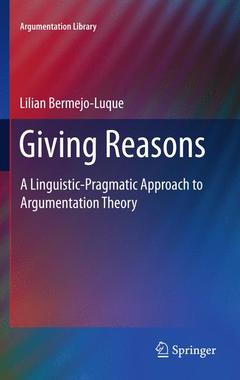Description
Giving Reasons, 2011
A Linguistic-Pragmatic Approach to Argumentation Theory
Argumentation Library Series, Vol. 20
Language: English
Subject for Giving Reasons:
Keywords
Argumentation; Argumentation Theory; Argumentative Value; Burden of Proof; Cognitivism; Deductivism; Deep Relativism; Dialectics; Douglas Walton; Formal Logic; Frans H van Eemeren; Indirect Judgements; Inference; Informal Logic; Instrumentalism; Interpretation; Justification; Logical Possibilities; Nature of Logic; Normativity
Giving Reasons
Publication date: 11-2013
209 p. · 15.5x23.5 cm · Paperback
Publication date: 11-2013
209 p. · 15.5x23.5 cm · Paperback
Giving reasons: a linguistic-pragmatic approach to argumentation theory (hardback) (series: argumentation library)
Publication date: 07-2011
209 p. · 15.5x23.5 cm · Hardback
Publication date: 07-2011
209 p. · 15.5x23.5 cm · Hardback
Description
/li>Contents
/li>Comment
/li>
This book provides a new, linguistic approach to Argumentation Theory. Its main goal is to integrate the logical, dialectical and rhetorical dimensions of argumentation in a model providing a unitary treatment of its justificatory and persuasive powers. This model takes as its basis Speech Acts Theory in order to characterize argumentation as a second-order speech act complex. The result is a systematic and comprehensive theory of the interpretation, analysis and evaluation of arguments. This theory sheds light on the many faces of argumentative communication: verbal and non-verbal, monological and dialogical, literal and non-literal, ordinary and specialized.
The book takes into consideration the major current comprehensive accounts of good argumentation (Perelman?s New Rhetoric, Pragma-dialectics, the ARG model, the Epistemic Approach) and shows that these accounts have fundamental weaknesses rooted in their instrumentalist conception of argumentation as an activity oriented to a goal external to itself. Furthermore, the author addresses some challenging meta-theoretical questions such as the justification problem for Argumentation Theory models and the relationship between reasoning and arguing.
The book takes into consideration the major current comprehensive accounts of good argumentation (Perelman?s New Rhetoric, Pragma-dialectics, the ARG model, the Epistemic Approach) and shows that these accounts have fundamental weaknesses rooted in their instrumentalist conception of argumentation as an activity oriented to a goal external to itself. Furthermore, the author addresses some challenging meta-theoretical questions such as the justification problem for Argumentation Theory models and the relationship between reasoning and arguing.
Preface.- I Argumentation and Its Study.- II Why Do We Need a New Theory of Argumentation?.- III Acts of Arguing.- IV The Logical Dimension of Argumentation.- V The Dialectical Dimension of Argumentation.- VI The Rhetorical Dimension of Argumentation.- VII Argumentation Appraisal.- References.
Provides Argumentation Theory with a new, linguistic approach Integrates argumentation’s logical, dialectical and rhetorical dimensions Solves challenging meta-theoretical questions, e.g. the justification problem
© 2024 LAVOISIER S.A.S.

